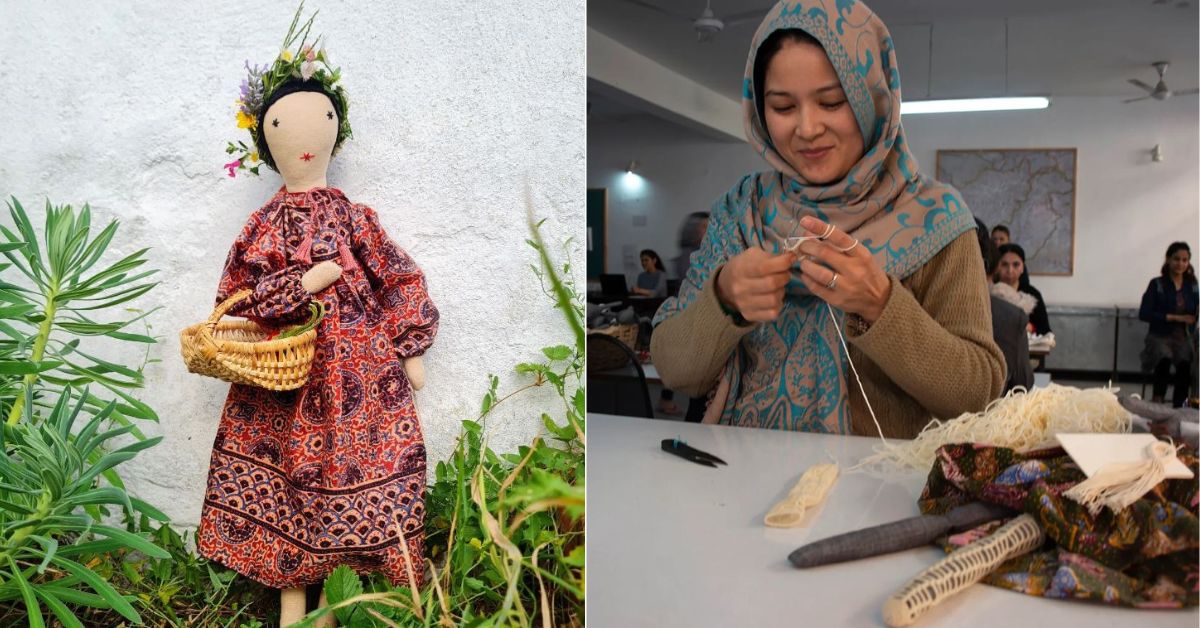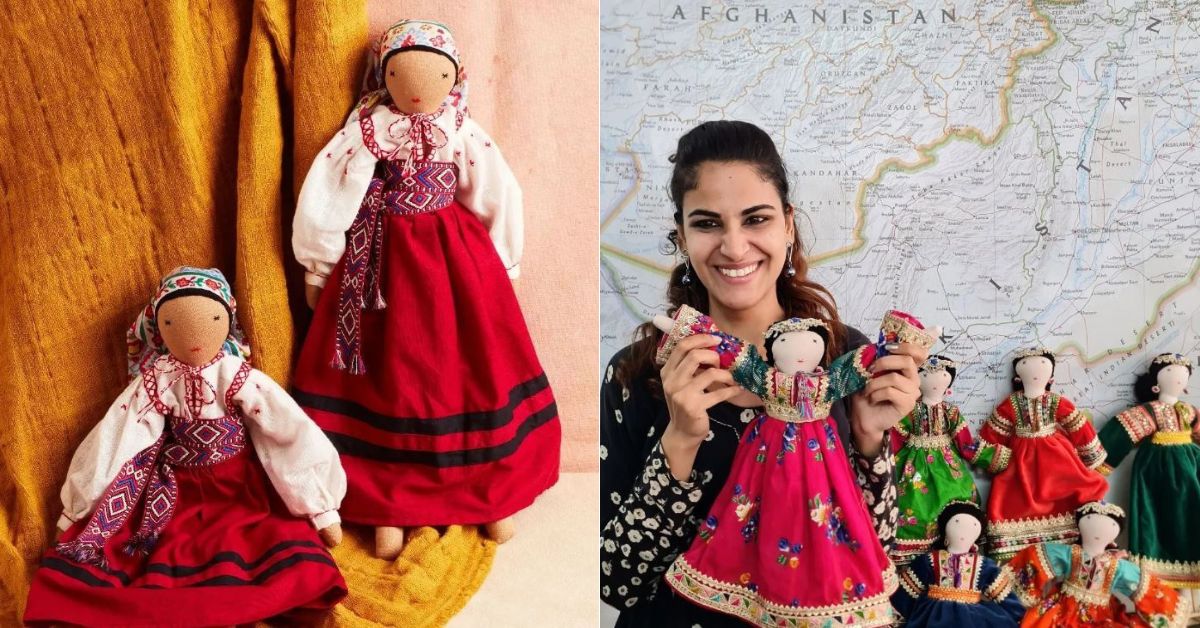In 2017, Iris Strill and Bishwadeep Moitra met a group of Afghan refugee women in Delhi who were struggling to survive due to lack of employment and income. These women had fled Afghanistan when the Taliban resurgence began in 2010-11.
“In 2011, shortly after the US killed Osama bin Laden, it started withdrawing troops from Afghanistan. After some time, the Taliban started coming back with new leaders. Meanwhile, its women started seeking shelter in India,” says Bishwadeep.
“When we met them in Delhi, their situation was dire. They were hardly surviving as they were without any employment and incomes. They were forced to sell whatever they had brought from their homeland,” he adds.
The couple was motivated to financially empower these Afghan women. A year later in 2019, the couple started ‘SilaiWali’, a social enterprise that creates rag dolls, pouches, purses, wall art, and hangings from upcycled waste fabric generated in excess from garment manufacturing units.
Starting with 10 women, they are now providing a livelihood to more than 70 Afghan refugee women. While doing so, they have also been able to divert more than 15,000 kg of fabric from entering into landfills.

Bringing different nationalities together
Iris, an art and design student from France, had come to India in the 1990s for her diploma project as part of her final year assignment of art school. She started coming to India to work with various non-profit organisations to train Indian artisans in making products that could be sold in the international market.
She permanently settled in India in 2006 after her marriage to Bishwadeep, a former journalist, whom she met at a yoga centre.
Iris continued to work as a design consultant with international clothing brands. That’s when she was struck by the massive amounts of fabric waste generated by the fashion industry in India.
“She used to visit many of these factories in Delhi, which is a big production hub for many international fashion brands. She discovered that fabric waste is discarded in extreme bulk quantities. It was here that she was struck with the idea to use the scraps for making a useful product,” shares Bishwadeep.
“As she was already training artisan groups, she came across a marginalised group of Afghan refugee women. The refugee issue was close to her heart. We thought that this could be a good idea as it was difficult for us also to tap into the talents of artisans who live in far off tribal villages. We decided to marry both the concepts of upcycling fabric waste and generating employment for refugee women,” he adds.
In a bid to do something meaningful, Bishwadeep quit his job as an executive editor at Outlook news magazine and co-founded SilaiWali along with his wife. “Journalism allowed me a way to work for society but I wanted to do something differently and I wanted to be of service to society in a direct way. I was motivated by my wife to work at the grassroots level,” he adds.
Thereafter, the couple decided to start SilaiWali in 2018 for financial independence of Afghan women refugees in India.

Catering to 150 cities worldwide
At the company, Bishwadeep shares that after the waste fabric is sourced from garment factories, it is sorted, cut, and transformed by these refugee artisans into dolls and other home decor items; incorporating traditional embroidery, sewing, and crocheting techniques.
The handcrafted dolls reflect the personalities and stories of the artisans, making each creation a symbol of resilience and creativity. “It is all handwork and each doll reflects the unique personalities of the artisan who crafted it,” he adds.
SilaiWali participates in trade shows in the US and Paris, boosting its presence in the global market. With this, the couple has been able to tap into a growing demand for these dolls in 150 cities worldwide in the United Kingdom, Japan, Korea, France, and Australia, and in Delhi, Mumbai, Jaipur, Chennai, and Goa within India.
The handcrafted items by SilaiWali range from Rs 820 to Rs 5400. The brand exports goods worth $200,000 every year, with peak seasons around September to December to cater to Christmas and Halloween orders.
So far, SilaiWali claims to have trained and reskilled 325 women refugees. “At one point, we had 150 such women working with us. But most of them migrated to Canada due to changing immigration policies,” shares Bishwadeep. Despite facing such challenges, SilaiWali continues to make a significant impact.
Talking about the wages of the artisans, Bishwadeep says it is calculated following the wage ladder mandated by the World Fair Trade Organisation. “While the incomes vary from artisan to artisan, they earn between Rs 12,000 to Rs 14,000 every month. It can also increase depending on factors like sales and special orders,” he adds.
Sharing her experience of working with these women, Iris says, “Afghan women have a pleasant demeanour. They are very proud of their heritage. They listen to my instructions and are not afraid to disagree with me when necessary. They have shown amazing resilience in rebuilding their lives in India, however temporary their current residence may be. Many SilaiWali women have broken the glass ceiling by being the sole-earning members of their families.”
“Earlier, these families were struggling to make ends meet. Their children couldn’t be sent to school. We are glad that our intervention has somewhat eased their situation,” adds Iris, who finds this work extremely fulfilling.
Looking back at his decision to quit journalism to establish a career in the social enterprise sector, Bishwadeep says, “What we do impacts so many families and provides them with dignity, spending power, demolishing the patriarchal system, and creating an impact that can be seen on the ground. This work gave me an opportunity to directly engage with the marginalised sections at the grassroots.”
Edited by Padmashree Pande. All photos: SilaiWali social verticals.
No comments:
Post a Comment